- Home
- Neal Stephenson
The Mongoliad: Book Three Page 37
The Mongoliad: Book Three Read online
Page 37
The Kitayan slashed upward with the knife, and Haakon twisted his sword to his left, trying to smack the Kitayan’s wrists with the wooden blade. Get him to drop the knife. The Kitayan staggered, dropping his center of gravity, and the sword skipped off his upper arm. Haakon felt his arms going too far to the left, and the Kitayan’s hands were on the outside, the knife blade coming up and around Haakon’s hands. Haakon skipped back, swinging the sword around in a clumsy backhand at the Kitayan’s closest knee. He made contact, but the Kitayan didn’t flinch or stumble. A weak blow. Not enough to distract him.
The Kitayan snapped his arm out, flicking the knife at Haakon’s face. He jerked his head back, and he felt the tip of the knife slice his cheek.
He was in the wrong position. His hands were low, and his opponent’s weapon was inside his guard. This wasn’t a sword fight anymore; it was close quarters combat. If he had a steel sword, he wouldn’t be able to use it effectively.
But the weapon in his hands was nothing more than a piece of wood, and wood didn’t have an edge to worry about.
Haakon snapped his wrists up, and his sword smacked the Kitayan on the underside of his knife arm, near the elbow. He maintained the contact between flesh and wood and stepped into the other man, putting his weight behind the shove. The Kitayan lurched back, and Haakon caught the knife hand just behind the wrist with his left hand. Pulling down with that hand, he used the wooden sword as a lever and forced the Kitayan off balance.
The Kitayan tried to cut him with the knife, but Haakon’s grip restricted the range of available motion. Haakon smashed the sword against the Kitayan’s elbow—once, twice—and the man grunted in pain. Haakon twisted and pushed, and the Kitayan bent over in an effort to keep his arm from being dislocated. Haakon continued to drive his opponent before him, and when he dropped to his knees, the Kitayan went first, his face smashing painfully into the rocky soil.
Haakon twisted the arm until the Kitayan screamed, and then he pushed off the fallen man, stripping the knife free of the Kitayan’s now slack fingers as he stood.
The audience howled with delight and the ground rumbled from many feet, stomping in unison. Haakon shivered, knowing what they wanted to see, and slowly, the knife held loosely in his left hand, he turned toward the raised platform. In his mind, he saw Onghwe Khan’s pavilion in the Circus arena. He had just won his match and was still holding Zug’s knife.
The Khagan’s platform was much closer.
His fingers toyed with the knife, moving it around in his hand. Moving it into a better position to throw.
A giant figure burst through the crowd next to the platform, shoving his way into the circle. He wasn’t as tall as Krasniy, the red-haired giant who was also a prisoner, but his shoulders were as wide. He jabbed a finger at Haakon, exhorting him to drop the knife.
Could he do it? Would the knife fly true?
Haakon pretended to not understand the muscular Mongol’s words. He recognized the man’s voice as the one he had heard earlier, responding to the Khagan’s questions. He shrugged, holding up his wooden sword as if the stick was the item being discussed. In his left hand, his fingers stopped fussing with the knife, settling on a good grip.
The Mongol kept coming—not hurriedly and not cautiously, but in long confident strides across the fighting ring. His path put him between Haakon and the platform.
Haakon backed up, maintaining a visible pantomime of confusion, though he let go of neither weapon. Each step took him farther from the Khagan, increasing the distance the knife was going to have to travel if he threw it.
Was he strong enough to make the sacrifice?
The Mongols would kill him. He might be able to keep the captain at bay for a little while with the wooden sword, but the crowd would turn into a frenzied mob. They would overwhelm him. Would they tear him to pieces immediately or would they torture him first? What if he missed the Khagan or didn’t deliver a mortal wound with the thrown knife. Would his punishment be any less severe?
The Kitayan sat up, blood dotting his nose and lips. His right arm hung awkwardly at his side, and his eyes widened as he caught sight of Haakon.
As the Kitayan was struggled to get to his feet, the tall Mongol reached down and easily picked up the Kitayan. The Kitayan shrieked as the Mongol hurled the smaller man.
Haakon was completely unprepared. No one had thrown a human body at him before, and he froze. He caught a quick glimpse of the whites of the Kitayan’s eyes and the man’s open mouth, and then one of the Kitayan’s elbows glanced off his cheek as they collapsed in a heap. The air was forced from his lungs as he was caught between the Kitayan and the ground. He struggled to push the stunned man off him.
A shape threw a shadow across him, and he looked up to see the ridged line of the captain’s knuckles zooming in at him, and then more shadows came, blotting out all the light.
“Can you believe that?” Tarbagatai shouted in Gansukh’s ear.
“I can,” Gansukh laughed, slapping the young archer on the shoulder. “I have had personal experience with Namkhai’s strength.”
The crowd was frenzied with excitement, and the tumult of their jubilation was so pronounced that speaking loudly enough for someone other than your immediate neighbor to hear was impossible. Gansukh couldn’t hear the conversation Munokhoi was having with the moneylender, but the ex–Torguud captain’s body language was easy to read.
Munokhoi shook his head sharply, his hands clenched into fists. The moneylender shrugged, unperturbed by Munokhoi’s ire, and when the ex–Torguud captain stepped even closer, threatening the smaller man with his angry presence, the moneylender waved at the nearby cluster of Torguud. Munokhoi backed off with a sneer as the Torguud drifted toward the cornered moneylender.
Gansukh wandered over, wearing as innocent an expression as he could muster. “Fifty cows,” he said loudly. “My family will really appreciate those cows, Munokhoi.”
“I owe you nothing, country boy,” Munokhoi snarled.
“Well, someone owes me some cows,” Gansukh said, ignoring Munokhoi and directing his attention toward the moneylender. “If Munokhoi isn’t going to pay what he owes, maybe I should be asking you for them instead.”
“Me?” The moneylender was incredulous.
“I clearly heard him make the wager, didn’t you?”
The moneylender waved his hands, clearly not wanting to be a part of the conversation.
“I wonder how the Kitayan came by that knife?” Gansukh made a show of puzzling over this question. “Isn’t it odd that Munokhoi was so eager to match my wager? Almost as if he—”
Growling like a cornered wolf, Munokhoi stormed up to Gansukh, grabbing Gansukh’s jacket with both hands. He put his face close to Gansukh’s. “You are not as clever as you think,” he raged.
“I do not doubt that,” Gansukh replied. He stood very still, his hands loosely at his sides. As long as Munokhoi had both hands on his jacket, Gansukh wasn’t too worried about what the other man might try. “Still,” he continued, “the issue isn’t who is more clever, but which of us has a better grasp on sums.”
Munokhoi bared his teeth, his eyes focusing on the tip of Gansukh’s nose. “I will kill you, country boy,” he whispered.
Gansukh merely smiled, holding Munokhoi’s gaze.
Munokhoi’s hands tightened, and Gansukh heard the grinding strain of Munokhoi’s jaw as he clenched his teeth. With a mighty effort, Munokhoi composed himself and let go of Gansukh with a tiny shove. “A lucky bet,” he growled.
“The Blue Wolf favors me,” Gansukh acknowledged with a small nod.
Munokhoi pursed his lips, holding his words in check. He glared at the surrounding crowd, and Gansukh could see him assessing the general mood of those who were paying more attention to this disagreement than the aftermath of the fracas in the fighting ring. Munokhoi’s jaw worked for a few seconds, and then he spat—decisively—on Gansukh’s boot. “You’ll get your cows,” he said, though the tone of his voice sugge
sted otherwise. He stalked away, elbowing his way through the press of bodies that were sluggish to open a path for him.
“I’m sure I will,” Gansukh called after him, a mocking lilt in his voice. Just enough to gall Munokhoi one last time. Push him a little farther. He’s already so close to the edge.
Ghaltai led Chucai along the twisting course of an empty riverbed. The ground was rough, and Chucai gamely stumbled after the sure-footed Darkhat. The moon offered enough illumination to see the other man but not enough to reveal all the loose stones and jagged pieces of rock that filled the old waterway. They had left the horses an hour ago, and Ghaltai had refused to light a torch—partly, Chucai was certain, as petty revenge for Chucai having dragged him away from the feast.
But mostly because the Darkhat was afraid. Was he a superstitious old fool who had lived in his self-important exile too long, or was there something to his apprehension about the spirits of the mountain? Chucai had ample time to consider both possibilities, and as much as he wished it were otherwise, the simple reason they were climbing the mountain in the dark was because he couldn’t dismiss the possibility that the latter concern of the Darkhat was actually true.
The route steepened, forcing Chucai to pay more attention to where he put his feet. Ghaltai scrambled up the incline, and Chucai resorted to clawing at the loose rock with his hands for the last few steps before he reached a narrow plateau.
He paused and looked back, making note of their route, and realized it was pointless to try to discern the track in the dark. The riverbed followed a complicated course through the exposed strata of the mountainside; it wasn’t a route he could trace back down with his eyes. He would simply need to stay in the riverbed, and trust that it would take him to lower ground. The spirits provide a way, he thought, but you have to trust them.
They were on rocky ground, a flat expanse that jutted out from the base of a rocky pinnacle that towered high overhead. The ground sloped downward as he walked away from the ledge, and Chucai realized it was an old pool. Striations and runnels in the rock face revealed where the water had once cascaded down from the peak, pooling on this flat spot before leaping over the edge again and gouging a serpentine path down to the valley far below.
Ghaltai led him toward a darker spot on the rock face, and when he walked right up to the wall and vanished, Chucai realized the darkness was a rough opening the rock. He followed the Darkhat, reaching out and touching the wall on either side of the narrow passage. The rock was smooth, worn by time and tools, and he let his fingers trace along the cool rock as he blindly followed Ghaltai into the mountain.
The tunnel turned to his left and dipped down. He heard a distant sound, a steady dripping noise—water falling into water—and the air remained fresh and pure. As the sound became louder, the darkness became less absolute. At first, he merely thought his eyes had become accustomed to the gloom, but as he started to notice tiny glimmers in the walls around him, he realized he was seeing evidence of some sort of illumination. The tunnel turned again, and now nearly able to see both hands touching either wall, he went around the curve and found himself in a large cavern.
The ceiling was more than twice as tall as he was and covered with a layer of luminescent lichen. There were several dark holes in the ceiling, and judging from the purity of the air in the cavern, Chucai surmised they were actually open to the sky. As he wandered into the cavern, he caught sight of the pale moon peeking down through one of the lowermost holes.
The cavern was longer than it was wide, narrowing in the back to a series of three passages, and the chamber was empty but for a series of five platforms, large discs of stone raised a few aid off the dark and dusty floor. The discs were clearly manmade, with narrow lips and sunken centers. Two of them held water, and the sound he had heard was the steady drip-drip coming from somewhere in the ceiling into the larger of the two pools.
The stone in the water-filled pools was lighter than the surrounding stone, and Chucai bent to inspect the floor. Part of the thick layer of sediment strewn throughout the cavern had the gritty texture and color of ash.
There had been a fire.
The ash marked the walls, where the stone wasn’t covered by the creeping lichens. On the right-hand wall, there was a texturing that didn’t seem random. Chucai used his sleeve to wipe away some of the grime, and when he reached the lichen, he used a stone to scour the wall clean. Eventually, he uncovered a large drawing, carved into the rock.
It was a picture of a tree, gnarled like an old man with thick roots that reached all the way to the floor and a tangled mass of leaves of branches that went up farther than he could readily reach.
CHAPTER THIRTY-SIX
Summus Pontifex Ecclesiae Universalis
Rodrigo was beginning to wonder if he had been forgotten. He did not mind the solitude, but his stomach—so recently filled at the Septizodium—was reluctant to return to the previously lean weeks leading up to his arrival in Rome. It grumbled again, and this time—as if God had heard the noisy sound of his belly—the door to his chamber opened and two men slipped into the room; each held a platter, one with fruits and cheeses, the other with cold sliced meat. He recognized them from the Septizodium, though they were now wearing much more regal clothing than they had previously. With kind smiles, they set the plates on the small table beside where he sat, and both of them gestured invitingly toward the food. Capocci—the shorter one—had white bandages on his hands.
“Do you remember us?” the taller of the two men asked as Rodrigo began to eat.
Rodrigo frowned in concentration, his hand—holding a grape—frozen near his mouth. “You are Giovanni Colonna,” he said. “You were the first—no, the second—man I met in the Septizodium.” He put the grape down on the plate. “And you are Capocci,” he said to the other man. “You examined my teeth, before...”
Rodrigo felt an immense weight in his stomach, as if the few morsels of food he had just swallowed were now turning to stone in his belly. “Your hands are burned,” he sighed. “You did not come out of the fire with us. You went back in and tried to rescue Cardinal Somercotes.”
“Yes,” said Capocci. “I did.” He seemed embarrassed by Rodrigo’s observation, and the sight of his bandage-covered hands only appeared to make his shame greater.
“In light of the devilry caused by that accident,” Colonna said, drawing everyone’s attention away from Capocci’s wrapped hands, “we have elected to intrude upon your private vigil. There is an urgent matter we need to discuss.”
Rodrigo nodded toward each of them. “Of course, Your Eminences.”
“Do you know who the current Pope is?” Colonna asked.
“Gregory... oh, no,” Rodrigo corrected himself. “Cardinal Somercotes told me that Gregory has died.” How strange: that news, when first he’d heard it, had been devastating, for back then he had not really understood the nature of his great mission in Rome. Now that he knew the real purpose of his coming here, seeing the Pope was almost irrelevant. “And we were brought here—to the Vatican—to elect a new Pope. Has that happened?”
“Yes,” said Capocci. “But do you know who he is?”
Rodrigo grimaced. “No.”
“Well, we’re here to tell you, and it will probably be a surprise.”
Rodrigo was fairly confident he was beyond being surprised by anything, at this point. But he wished to be polite, so he gave them a curiously expectant expression.
“Your Holiness...” Colonna began.
“Your what?” Rodrigo asked, knitting his brows.
“Your Holiness—you have been elected Pope.”
This was a remarkable statement, yet Rodrigo felt calm hearing it. Something about it resonated, almost as if he had been expecting such announcement. It fit into the evolving tapestry of his day: of course he did not need to take a message to the Pope, if he himself was the Pope. In fact, his being the Pontiff was convenient, as it meant he would not have to convince some other man of the importance of h
is mission.
“All right,” he said, after a moment. “All to the good.”
Capocci and Colonna looked at each other, surprised.
“This is not a jest, Your Holiness,” Capocci said. “You may have reason to think of us as occasional pranksters—and you would be entirely within your rights to do so—but in this matter we come to you in absolute earnest. There was a vote. You were elected Bishop of Rome.”
“I see. That means somebody must first invest me as a bishop,” Rodrigo said. “Is that what you are here to do?”
The two Cardinals looked at each other. “I suppose we could do that,” Colonna said.
“We would need more witnesses,” Capocci pointed out.
Colonna shook his head. “It is all very unexpected and very unusual,” he said. “There may be precedence. We don’t know yet. The College of Cardinals is divided on this matter.”
“And will be for some time,” Capocci interjected.
“I was chosen,” Rodrigo mused, “though I was not even a candidate.”
“Yes,” Colonna said.
Rodrigo smiled. “I find that very reassuring. Clearly this is the will of God.”
Again both men seemed taken aback by Rodrigo’s calm acceptance, but they recovered quickly. “That is an excellent perspective, Your Holiness,” Colonna said.
Capocci nodded in agreement, a satisfied grin on his face. “As your friends,” he said, “which both of us are, unreservedly, we wanted to remind you that the Papacy is a sacred office. But it is a political appointment as well. If there are no complications, and you are, in fact, anointed as the head of the Church, there will be many people working diligently to influence you—even manipulate you. Everyone will tell you that they have only your best interests at heart, or the best interests of the Church.”

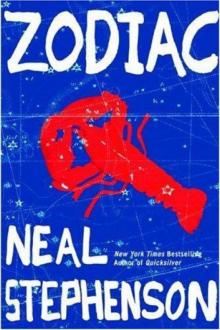 Zodiac: The Eco-Thriller
Zodiac: The Eco-Thriller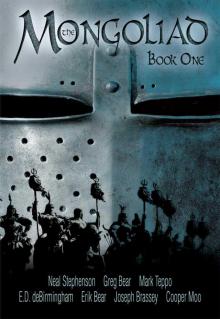 The Mongoliad: Book One
The Mongoliad: Book One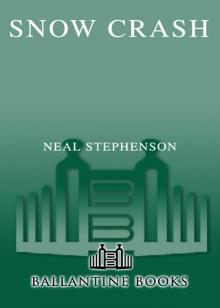 Snow Crash
Snow Crash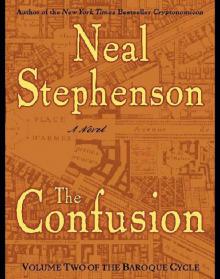 The Confusion: Volume Two of the Baroque Cycle
The Confusion: Volume Two of the Baroque Cycle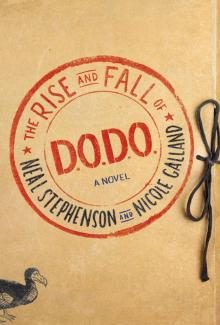 The Rise and Fall of D.O.D.O.
The Rise and Fall of D.O.D.O.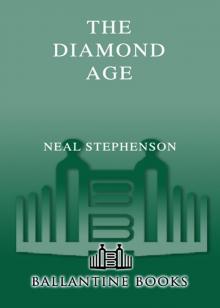 The Diamond Age: Or, a Young Lady's Illustrated Primer
The Diamond Age: Or, a Young Lady's Illustrated Primer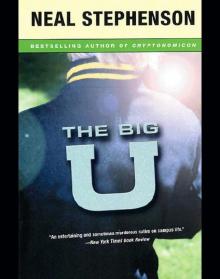 The Big U
The Big U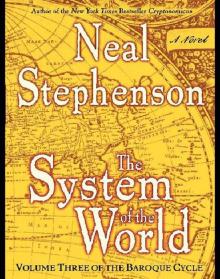 The System of the World: Volume Three of the Baroque Cycle
The System of the World: Volume Three of the Baroque Cycle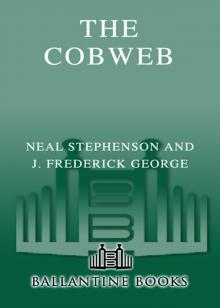 The Cobweb
The Cobweb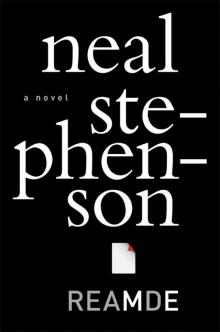 Reamde
Reamde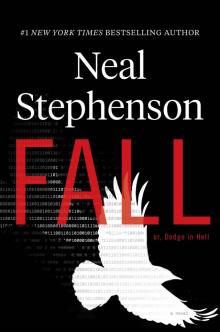 Fall; or, Dodge in Hell
Fall; or, Dodge in Hell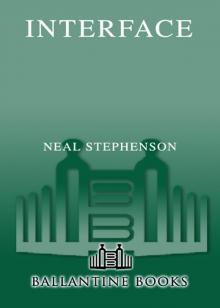 Interface
Interface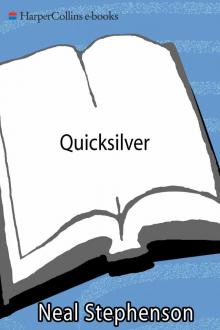 Quicksilver
Quicksilver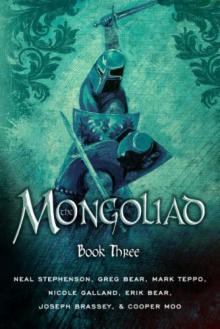 The Mongoliad: Book Three
The Mongoliad: Book Three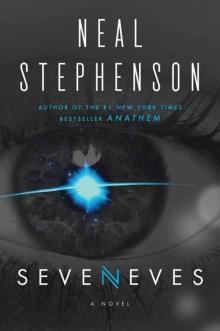 Seveneves
Seveneves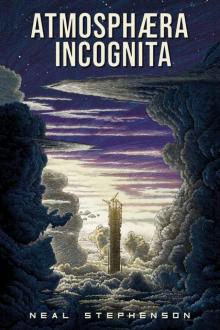 Atmosphæra Incognita
Atmosphæra Incognita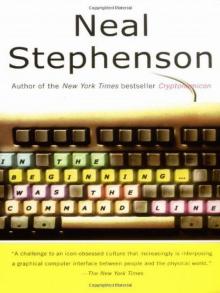 In the Beginning...Was the Command Line
In the Beginning...Was the Command Line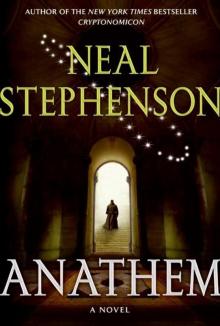 Anathem
Anathem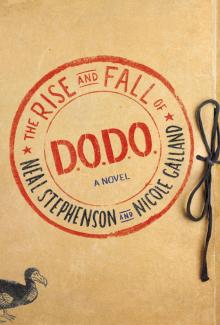 The Rise and Fall of D.O.D.O.: A Novel
The Rise and Fall of D.O.D.O.: A Novel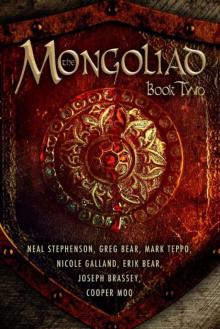 The Mongoliad: Book Two
The Mongoliad: Book Two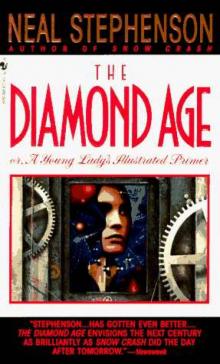 Diamond Age or a Young Lady's Illustrated Primer
Diamond Age or a Young Lady's Illustrated Primer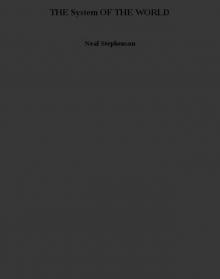 THE System OF THE WORLD
THE System OF THE WORLD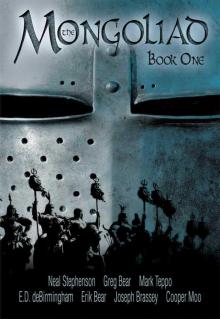 The Mongoliad: Book One tfs-1
The Mongoliad: Book One tfs-1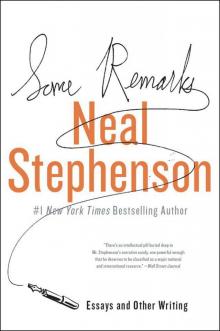 Some Remarks: Essays and Other Writing
Some Remarks: Essays and Other Writing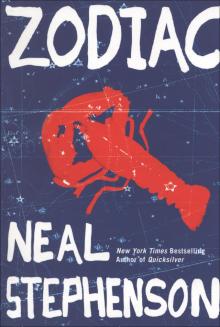 Zodiac
Zodiac Spew
Spew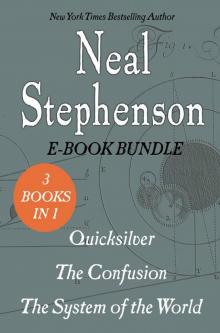 The Baroque Cycle: Quicksilver, the Confusion, and the System of the World
The Baroque Cycle: Quicksilver, the Confusion, and the System of the World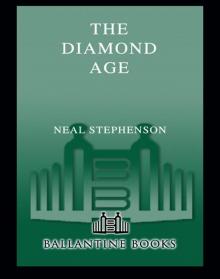 The Diamond Age
The Diamond Age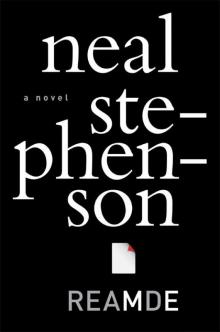 Reamde: A Novel
Reamde: A Novel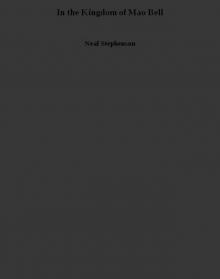 In the Kingdom of Mao Bell
In the Kingdom of Mao Bell Mother Earth Mother Board
Mother Earth Mother Board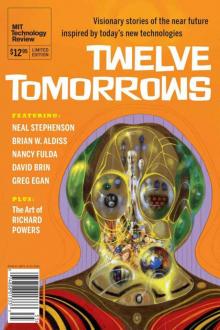 Twelve Tomorrows - Visionary stories of the near future inspired by today's technologies
Twelve Tomorrows - Visionary stories of the near future inspired by today's technologies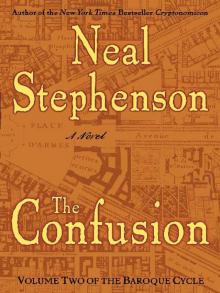 The Confusion
The Confusion The Great Simoleon Caper
The Great Simoleon Caper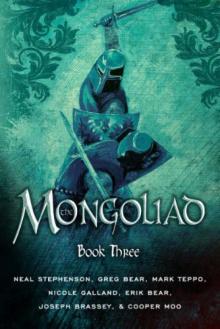 The Mongoliad: Book Three tfs-3
The Mongoliad: Book Three tfs-3